Joseph Chee Chang
Penalizing Transparency? How AI Disclosure and Author Demographics Shape Human and AI Judgments About Writing
Jul 02, 2025


Abstract:As AI integrates in various types of human writing, calls for transparency around AI assistance are growing. However, if transparency operates on uneven ground and certain identity groups bear a heavier cost for being honest, then the burden of openness becomes asymmetrical. This study investigates how AI disclosure statement affects perceptions of writing quality, and whether these effects vary by the author's race and gender. Through a large-scale controlled experiment, both human raters (n = 1,970) and LLM raters (n = 2,520) evaluated a single human-written news article while disclosure statements and author demographics were systematically varied. This approach reflects how both human and algorithmic decisions now influence access to opportunities (e.g., hiring, promotion) and social recognition (e.g., content recommendation algorithms). We find that both human and LLM raters consistently penalize disclosed AI use. However, only LLM raters exhibit demographic interaction effects: they favor articles attributed to women or Black authors when no disclosure is present. But these advantages disappear when AI assistance is revealed. These findings illuminate the complex relationships between AI disclosure and author identity, highlighting disparities between machine and human evaluation patterns.
SciArena: An Open Evaluation Platform for Foundation Models in Scientific Literature Tasks
Jul 01, 2025
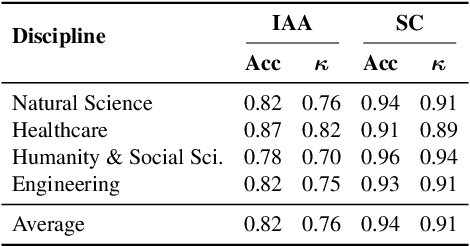

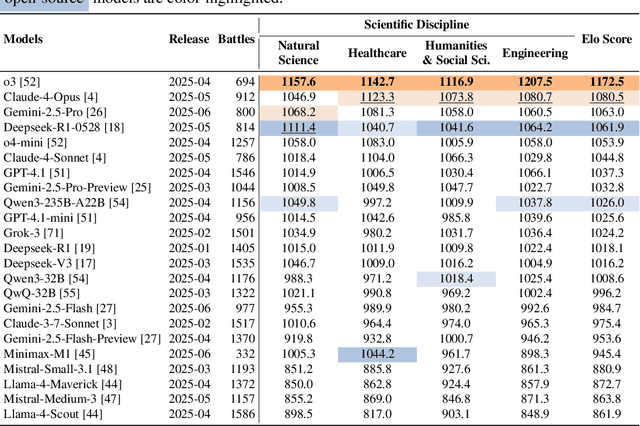
Abstract:We present SciArena, an open and collaborative platform for evaluating foundation models on scientific literature tasks. Unlike traditional benchmarks for scientific literature understanding and synthesis, SciArena engages the research community directly, following the Chatbot Arena evaluation approach of community voting on model comparisons. By leveraging collective intelligence, SciArena offers a community-driven evaluation of model performance on open-ended scientific tasks that demand literature-grounded, long-form responses. The platform currently supports 23 open-source and proprietary foundation models and has collected over 13,000 votes from trusted researchers across diverse scientific domains. We analyze the data collected so far and confirm that the submitted questions are diverse, aligned with real-world literature needs, and that participating researchers demonstrate strong self-consistency and inter-annotator agreement in their evaluations. We discuss the results and insights based on the model ranking leaderboard. To further promote research in building model-based automated evaluation systems for literature tasks, we release SciArena-Eval, a meta-evaluation benchmark based on our collected preference data. The benchmark measures the accuracy of models in judging answer quality by comparing their pairwise assessments with human votes. Our experiments highlight the benchmark's challenges and emphasize the need for more reliable automated evaluation methods.
Ai2 Scholar QA: Organized Literature Synthesis with Attribution
Apr 15, 2025Abstract:Retrieval-augmented generation is increasingly effective in answering scientific questions from literature, but many state-of-the-art systems are expensive and closed-source. We introduce Ai2 Scholar QA, a free online scientific question answering application. To facilitate research, we make our entire pipeline public: as a customizable open-source Python package and interactive web app, along with paper indexes accessible through public APIs and downloadable datasets. We describe our system in detail and present experiments analyzing its key design decisions. In an evaluation on a recent scientific QA benchmark, we find that Ai2 Scholar QA outperforms competing systems.
Cocoa: Co-Planning and Co-Execution with AI Agents
Dec 14, 2024



Abstract:We present Cocoa, a system that implements a novel interaction design pattern -- interactive plans -- for users to collaborate with an AI agent on complex, multi-step tasks in a document editor. Cocoa harmonizes human and AI efforts and enables flexible delegation of agency through two actions: Co-planning (where users collaboratively compose a plan of action with the agent) and Co-execution (where users collaboratively execute plan steps with the agent). Using scientific research as a sample domain, we motivate the design of Cocoa through a formative study with 9 researchers while also drawing inspiration from the design of computational notebooks. We evaluate Cocoa through a user study with 16 researchers and find that when compared to a strong chat baseline, Cocoa improved agent steerability without sacrificing ease of use. A deeper investigation of the general utility of both systems uncovered insights into usage contexts where interactive plans may be more appropriate than chat, and vice versa. Our work surfaces numerous practical implications and paves new paths for interactive interfaces that foster more effective collaboration between humans and agentic AI systems.
OpenScholar: Synthesizing Scientific Literature with Retrieval-augmented LMs
Nov 21, 2024



Abstract:Scientific progress depends on researchers' ability to synthesize the growing body of literature. Can large language models (LMs) assist scientists in this task? We introduce OpenScholar, a specialized retrieval-augmented LM that answers scientific queries by identifying relevant passages from 45 million open-access papers and synthesizing citation-backed responses. To evaluate OpenScholar, we develop ScholarQABench, the first large-scale multi-domain benchmark for literature search, comprising 2,967 expert-written queries and 208 long-form answers across computer science, physics, neuroscience, and biomedicine. On ScholarQABench, OpenScholar-8B outperforms GPT-4o by 5% and PaperQA2 by 7% in correctness, despite being a smaller, open model. While GPT4o hallucinates citations 78 to 90% of the time, OpenScholar achieves citation accuracy on par with human experts. OpenScholar's datastore, retriever, and self-feedback inference loop also improves off-the-shelf LMs: for instance, OpenScholar-GPT4o improves GPT-4o's correctness by 12%. In human evaluations, experts preferred OpenScholar-8B and OpenScholar-GPT4o responses over expert-written ones 51% and 70% of the time, respectively, compared to GPT4o's 32%. We open-source all of our code, models, datastore, data and a public demo.
Contextualized Evaluations: Taking the Guesswork Out of Language Model Evaluations
Nov 11, 2024



Abstract:Language model users often issue queries that lack specification, where the context under which a query was issued -- such as the user's identity, the query's intent, and the criteria for a response to be useful -- is not explicit. For instance, a good response to a subjective query like "What book should I read next?" would depend on the user's preferences, and a good response to an open-ended query like "How do antibiotics work against bacteria?" would depend on the user's expertise. This makes evaluation of responses to such queries an ill-posed task, as evaluators may make arbitrary judgments about the response quality. To remedy this, we present contextualized evaluations, a protocol that synthetically constructs context surrounding an underspecified query and provides it during evaluation. We find that the presence of context can 1) alter conclusions drawn from evaluation, even flipping win rates between model pairs, 2) nudge evaluators to make fewer judgments based on surface-level criteria, like style, and 3) provide new insights about model behavior across diverse contexts. Specifically, our procedure uncovers an implicit bias towards WEIRD contexts in models' "default" responses and we find that models are not equally sensitive to following different contexts, even when they are provided in prompts.
LLMs as Research Tools: A Large Scale Survey of Researchers' Usage and Perceptions
Oct 30, 2024



Abstract:The rise of large language models (LLMs) has led many researchers to consider their usage for scientific work. Some have found benefits using LLMs to augment or automate aspects of their research pipeline, while others have urged caution due to risks and ethical concerns. Yet little work has sought to quantify and characterize how researchers use LLMs and why. We present the first large-scale survey of 816 verified research article authors to understand how the research community leverages and perceives LLMs as research tools. We examine participants' self-reported LLM usage, finding that 81% of researchers have already incorporated LLMs into different aspects of their research workflow. We also find that traditionally disadvantaged groups in academia (non-White, junior, and non-native English speaking researchers) report higher LLM usage and perceived benefits, suggesting potential for improved research equity. However, women, non-binary, and senior researchers have greater ethical concerns, potentially hindering adoption.
ArxivDIGESTables: Synthesizing Scientific Literature into Tables using Language Models
Oct 25, 2024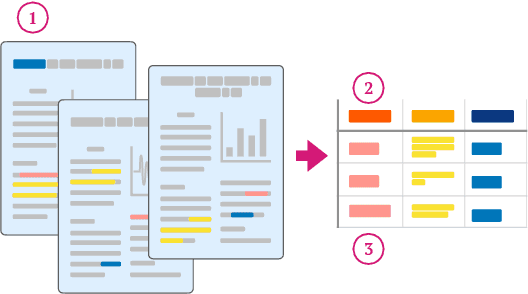

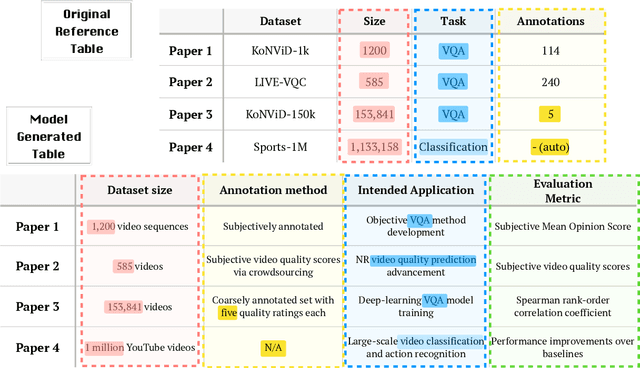

Abstract:When conducting literature reviews, scientists often create literature review tables - tables whose rows are publications and whose columns constitute a schema, a set of aspects used to compare and contrast the papers. Can we automatically generate these tables using language models (LMs)? In this work, we introduce a framework that leverages LMs to perform this task by decomposing it into separate schema and value generation steps. To enable experimentation, we address two main challenges: First, we overcome a lack of high-quality datasets to benchmark table generation by curating and releasing arxivDIGESTables, a new dataset of 2,228 literature review tables extracted from ArXiv papers that synthesize a total of 7,542 research papers. Second, to support scalable evaluation of model generations against human-authored reference tables, we develop DecontextEval, an automatic evaluation method that aligns elements of tables with the same underlying aspects despite differing surface forms. Given these tools, we evaluate LMs' abilities to reconstruct reference tables, finding this task benefits from additional context to ground the generation (e.g. table captions, in-text references). Finally, through a human evaluation study we find that even when LMs fail to fully reconstruct a reference table, their generated novel aspects can still be useful.
IdeaSynth: Iterative Research Idea Development Through Evolving and Composing Idea Facets with Literature-Grounded Feedback
Oct 05, 2024



Abstract:Research ideation involves broad exploring and deep refining ideas. Both require deep engagement with literature. Existing tools focus primarily on idea broad generation, yet offer little support for iterative specification, refinement, and evaluation needed to further develop initial ideas. To bridge this gap, we introduce IdeaSynth, a research idea development system that uses LLMs to provide literature-grounded feedback for articulating research problems, solutions, evaluations, and contributions. IdeaSynth represents these idea facets as nodes on a canvas, and allow researchers to iteratively refine them by creating and exploring variations and composing them. Our lab study (N=20) showed that participants, while using IdeaSynth, explored more alternative ideas and expanded initial ideas with more details compared to a strong LLM-based baseline. Our deployment study (N=7) demonstrated that participants effectively used IdeaSynth for real-world research projects at various ideation stages from developing initial ideas to revising framings of mature manuscripts, highlighting the possibilities to adopt IdeaSynth in researcher's workflows.
A Design Space for Intelligent and Interactive Writing Assistants
Mar 26, 2024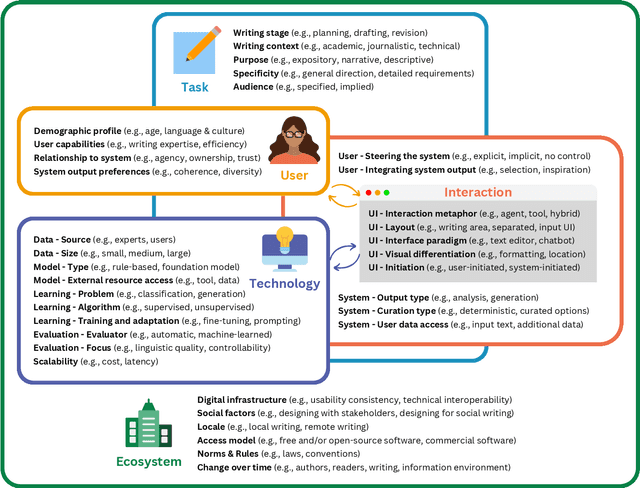
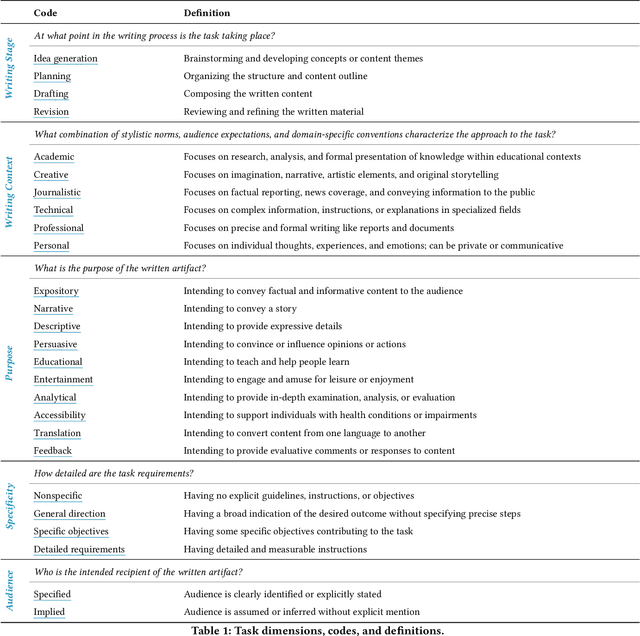
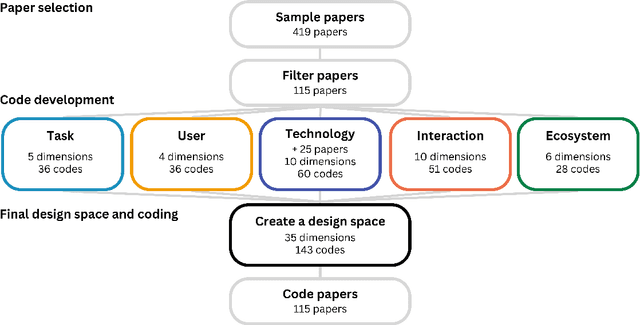
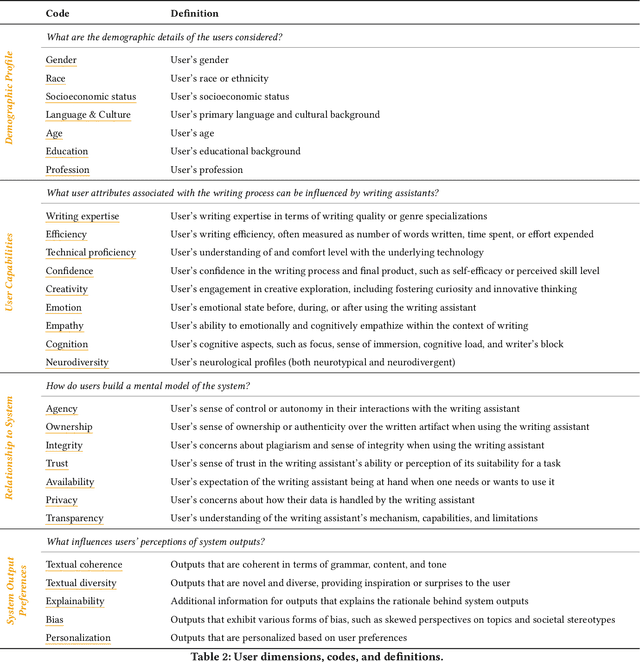
Abstract:In our era of rapid technological advancement, the research landscape for writing assistants has become increasingly fragmented across various research communities. We seek to address this challenge by proposing a design space as a structured way to examine and explore the multidimensional space of intelligent and interactive writing assistants. Through a large community collaboration, we explore five aspects of writing assistants: task, user, technology, interaction, and ecosystem. Within each aspect, we define dimensions (i.e., fundamental components of an aspect) and codes (i.e., potential options for each dimension) by systematically reviewing 115 papers. Our design space aims to offer researchers and designers a practical tool to navigate, comprehend, and compare the various possibilities of writing assistants, and aid in the envisioning and design of new writing assistants.
 Add to Chrome
Add to Chrome Add to Firefox
Add to Firefox Add to Edge
Add to Edge